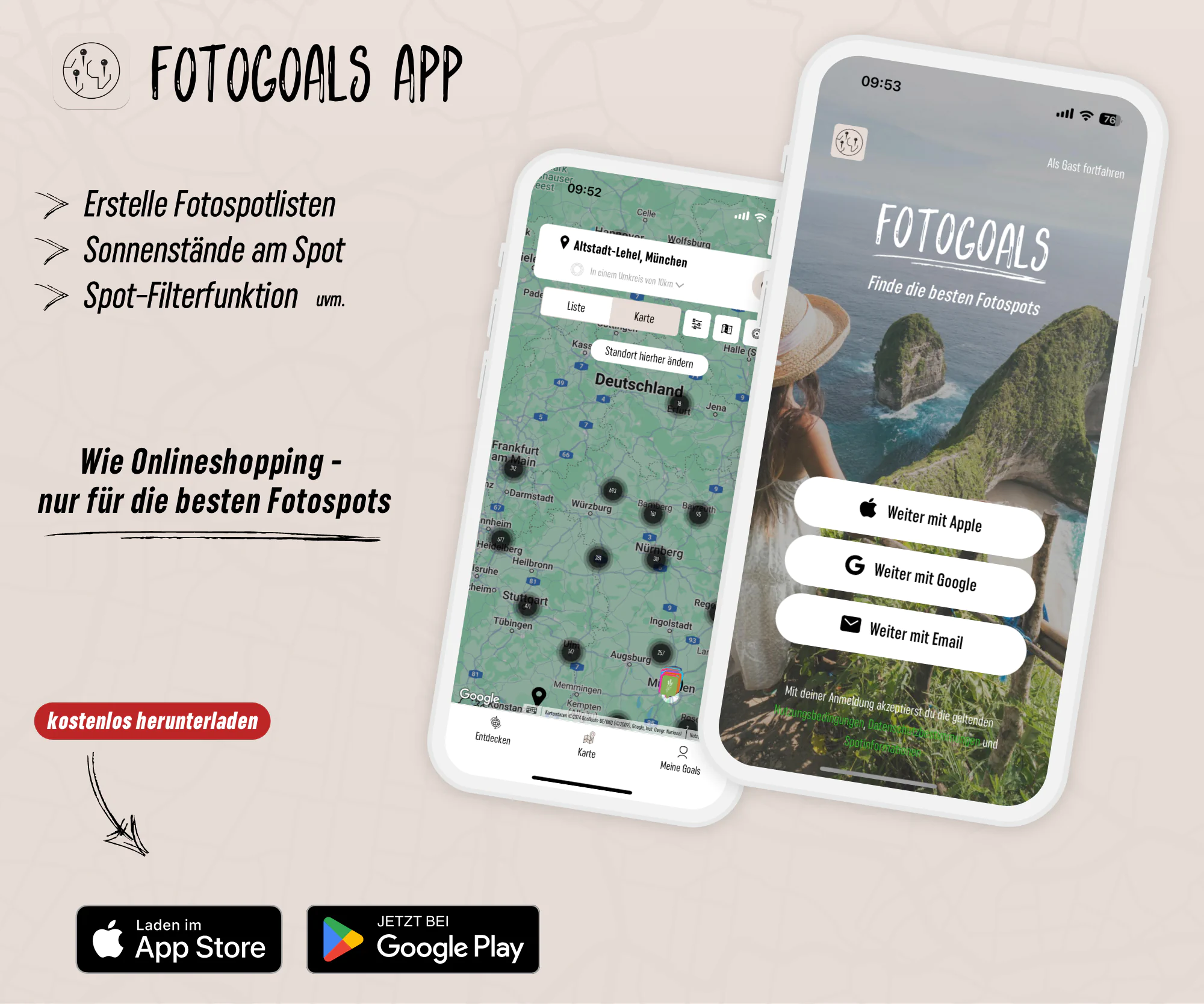United Arab Emirates
Immerse yourself in the fascinating world of the United Arab Emirates (UAE), which offers a rich diversity and unparalleled beauty. From impressive skyscrapers to majestic desert landscapes, the UAE offers a wealth of photo opportunities to delight any photography enthusiast. Explore the luxurious resorts, traditional souks and historic forts that reflect the cultural diversity and modern splendor of this unique country.
Sorry, no records were found. Please adjust your search criteria and try again.
Sorry, unable to load the Maps API.
The land of infinite possibilities
Photo spots in the UAE

Welcome to the land of superlatives – the United Arab Emirates (UAE), where photo spots invite you on a journey through the many facets of culture, history and breathtaking landscapes. From the impressive skyscrapers in Dubai and the vibrant city life in Abu Dhabi to the traditional souks in Sharjah and the majestic desert landscapes – the architecture and nature in the UAE reflect a fascinating diversity that inspires every photographer.
Explore the luxurious resorts in Ras Al Khaimah, the historic forts in Fujairah and the idyllic beaches in Ajman, which lie like oases in the desert. The UAE is a country full of contrasts, characterized by its rich history and cultural diversity, which enchants its visitors with every photo spot. From the small hidden gems to the vibrant metropolises, the UAE offers an almost infinite range of photo opportunities waiting to be discovered. Get ready to be captured by the beauty of this country and start your photo journey through the United Arab Emirates
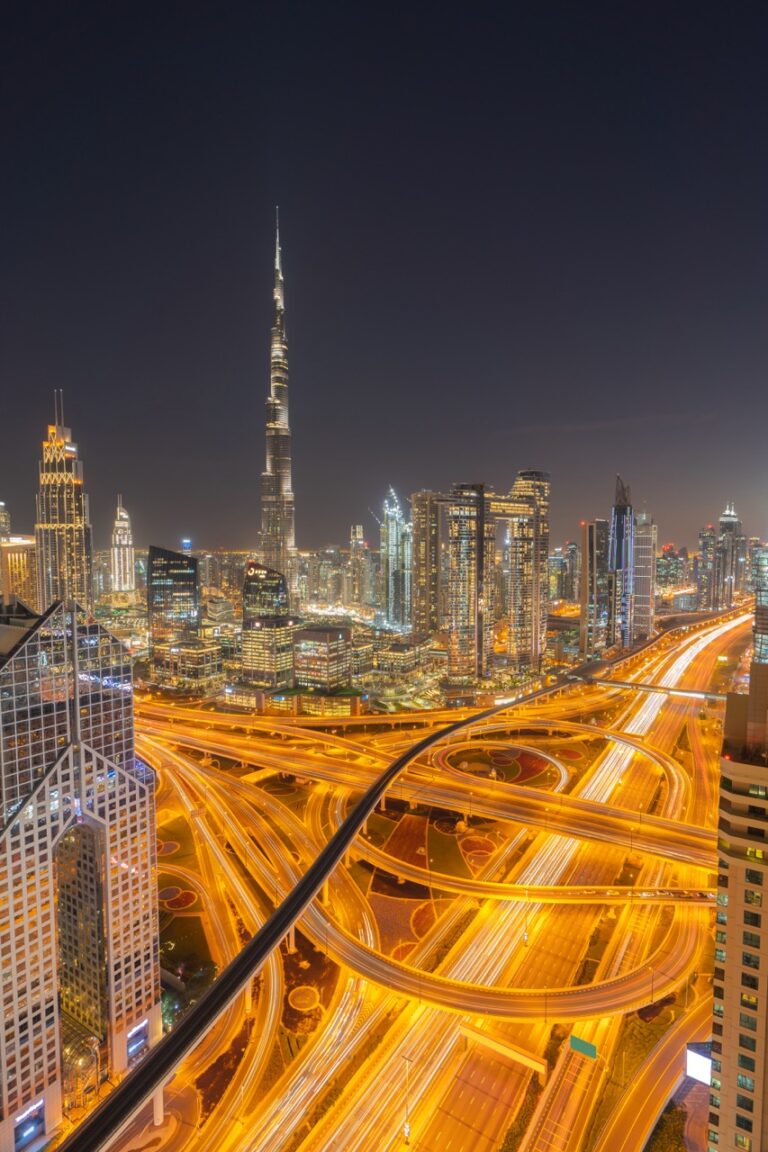
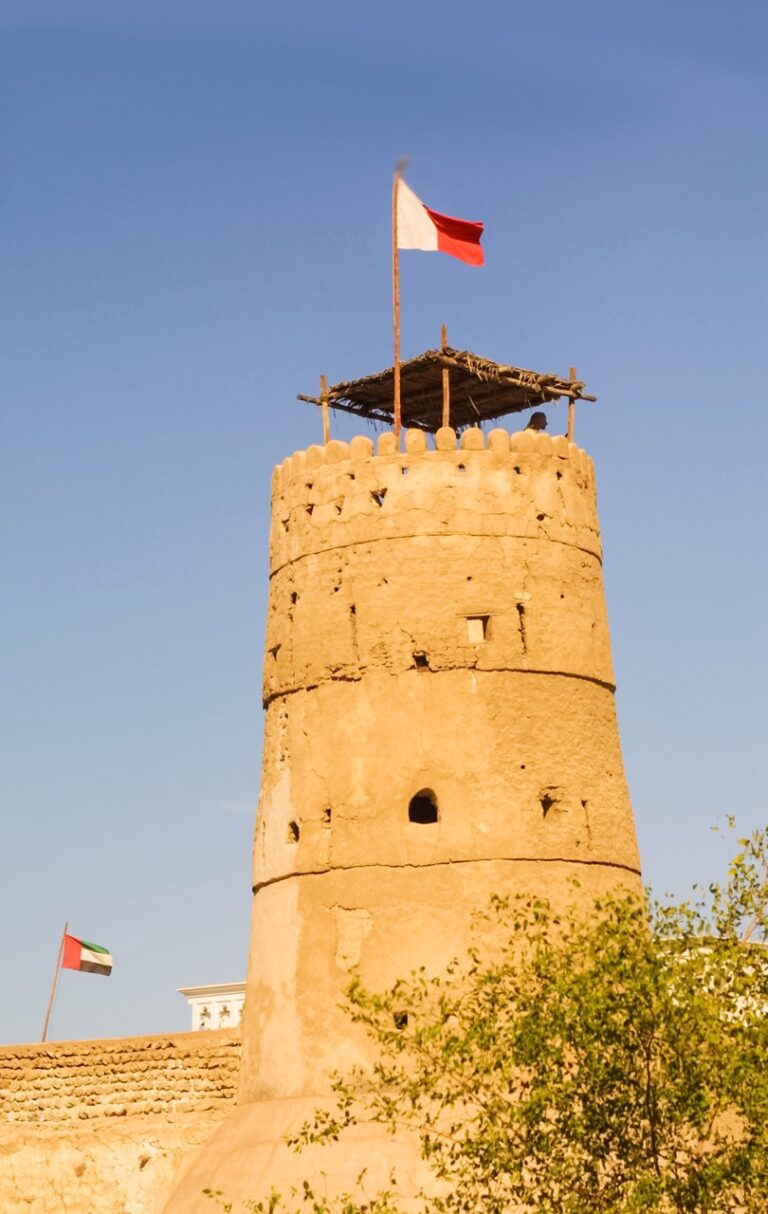
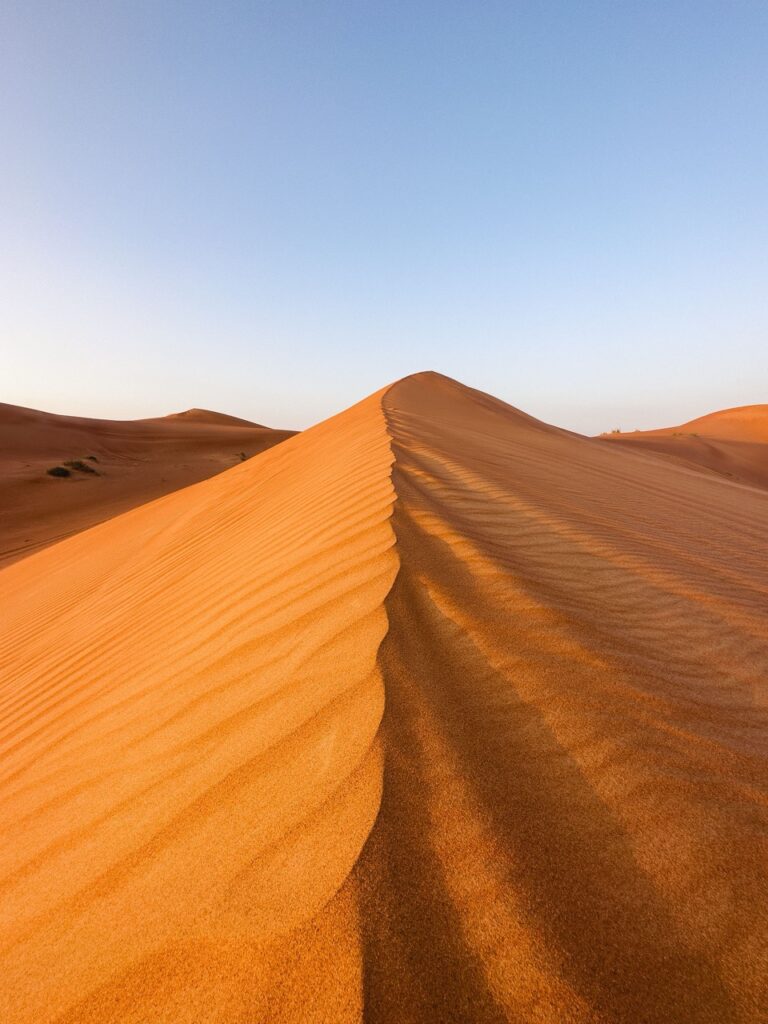
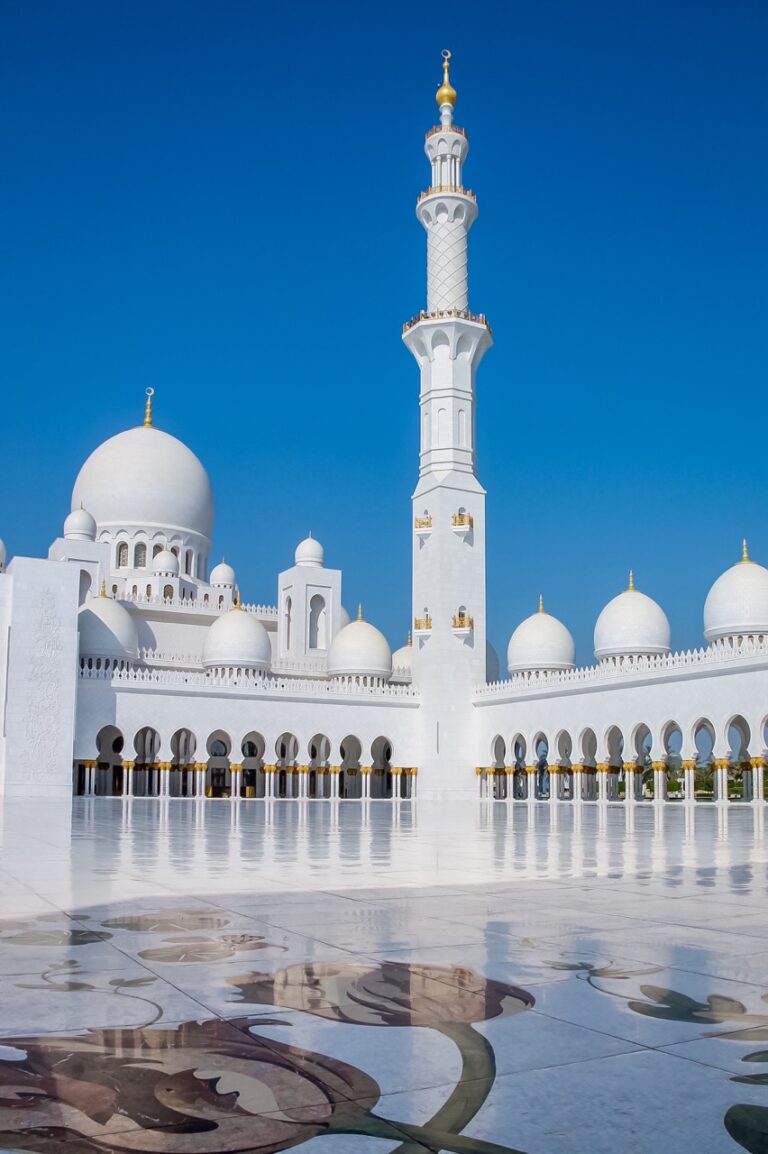
Good to know

Here you will find important information for your visit to the United Arab Emirates (UAE) or for your trip through this fascinating country in the Middle East. We’ll give you everything you need to get the most out of your stay in the UAE. Let’s go on a journey of discovery together and experience the best photo spots with Fotogoals!
Regions
The United Arab Emirates (UAE) consists of seven emirates: Abu Dhabi, Dubai, Sharjah, Ajman, Umm al-Quwain, Ras Al Khaimah and Fujairah. Each of these emirates offers its own unique sights and cultural highlights. Together, they form a rich diversity that needs to be explored. From the impressive skyscrapers and luxurious resorts of Dubai and Abu Dhabi to the historic forts and picturesque beaches of Fujairah and Ras Al Khaimah, the UAE offers a fascinating blend of tradition and modernity that will delight any visitor.
Currency
The official currency in the United Arab Emirates (UAE) is the dirham (AED), which is accepted as a means of payment throughout the country. The country’s largest banks include Emirates NBD, Abu Dhabi Commercial Bank (ADCB), First Abu Dhabi Bank (FAB) and Dubai Islamic Bank. ATMs can be found in banks as well as in many public places such as shopping centers, train stations and airports, making access to cash convenient and easy.
Mobile radio
The United Arab Emirates (UAE) has the country code +971 and the leading mobile operators are Etisalat and du. These providers offer a variety of tariffs and services that are suitable for both locals and tourists. The mobile network is generally well developed and offers extensive coverage, even in remote areas. In general, 4G LTE is well available and 5G is widely available in urban areas.
Grocery
In the United Arab Emirates (UAE), most supermarkets and shopping centers are open from Saturday to Thursday from around 9 or 10 am until 10 or midnight. On Fridays, many stores open later, often after Friday prayers. Some of the most popular retailers include Carrefour, Spinneys, Lulu Hypermarket, West Zone Fresh Supermarkets, Waitrose and more. They offer a wide selection of food and other products at affordable prices.
Transportation
There are a variety of transportation options in the United Arab Emirates (UAE). The Dubai Metro and Tram as well as the Abu Dhabi Buses offer efficient public transportation within the cities. There is also a well-developed network of buses connecting different cities and regions. Ride-sharing services such as Uber and Careem are widespread and offer flexible transportation options. Classic cabs are also readily available and can be conveniently ordered via app or by phone. Car rental companies such as Hertz and Avis offer a wide selection of vehicles for those who want to explore the UAE on their own.
Restaurant
The United Arab Emirates (UAE) has a diverse restaurant scene that offers something for every taste and budget. In addition to traditional restaurants serving Emirati cuisine, there are also a number of international chains and food stalls offering a wide range of dishes, from shawarma to upscale gourmet restaurants. Prices for main meals vary widely, but average between AED 40 and 100. It is customary to tip around 10% if it is not already included in the bill.

UAE - FAQ: Travel
Here you will find the answers to the most frequently asked questions about traveling to the United Arab Emirates
If you want to visit the United Arab Emirates (UAE), the best time to travel depends on your personal preferences and the activities you are planning. Winter (November to March) offers pleasant, mild weather and is ideal for outdoor activities, beach visits and sightseeing tours. Spring (April to May) offers warm weather and fewer tourists, while summer (June to September) is very hot but offers attractive activities and air-conditioned attractions. Autumn (October) offers a transitional period with more pleasant temperatures. When planning your trip, consider your personal preferences and interests to find the best time to visit the UAE.
If you wish to enter the United Arab Emirates (UAE), the need for a visa depends on your nationality, the purpose of your stay and the intended duration. Nationals of many countries, including EU member states, the USA and Canada, do not require a visa for short-term stays of up to 90 days within a 180-day period for tourism or business purposes. However, a visa may be required for longer stays or other purposes. It is important to check the current entry requirements and apply for a visa in good time if necessary.
If you are planning a vacation trip to the United Arab Emirates (UAE), the choice of airport depends on your destination and personal preferences. Most international flights land at major airports such as Dubai International Airport (DXB), Abu Dhabi International Airport (AUH) or Sharjah International Airport (SHJ). Dubai International Airport is the busiest airport and offers a wide range of connections. All airports are well connected to the public transportation network. If you have a specific destination in mind in the UAE, it may make sense to choose the closest airport. Find out about the various options in advance and choose the airport that best suits your travel plans.
If you are traveling to the United Arab Emirates (UAE), no special vaccinations are usually required. However, it is recommended that you keep your standard vaccinations up to date according to your home country's vaccination calendar. If you are traveling from countries with yellow fever infection areas, you may need to provide proof of a yellow fever vaccination. It is advisable to find out about current health and entry regulations before you travel and to seek medical advice if necessary.
Yes, many people in the United Arab Emirates (UAE) speak English, especially in urban areas, tourist centers and in business. English is a widely spoken language and is often studied as a second language at school. In hotels, restaurants, stores and tourist attractions, it is common for staff to speak English or at least have a basic knowledge of English in order to communicate with international visitors. If you don't speak Arabic, you can usually communicate in English to find your way around and get help.
UAE - FAQ: Daily life
Here you will find the answers to the most frequently asked questions about daily life in the United Arab Emirates
In the United Arab Emirates (UAE), the voltage is 230 volts and the frequency is 50 Hertz. The sockets correspond to the British type G. If you come from a country that uses other plug types, you may need an adapter to connect your electronic devices. These adapters are available in most electronics stores, airports and hotels. In better hotels, however, you will often find USB A sockets or multi-plug sockets that do not require the use of an adapter. However, it is recommended that you check whether you need an adapter before your trip to ensure that your electronic devices can be used without any problems.


Tap water in the United Arab Emirates (UAE) is generally safe and meets international standards for drinking water quality. However, many locals and visitors prefer to drink bottled water as the tap water can have a different taste due to the desalination processes. It is not necessary to buy bottled water unless you prefer the taste or want to play it safe. Drinking tap water is environmentally friendly and saves money during your stay in the UAE.
Payment by card, especially by credit card, is widespread in the United Arab Emirates (UAE). In larger stores, restaurants and bars in cities and tourist areas, payment by credit card is generally accepted. However, some smaller stores or local markets may only accept cash. It is therefore advisable to find out in advance whether payment with your credit card is possible.
Visa and Mastercard are accepted almost everywhere, while American Express and other cards may not be accepted everywhere. In supermarkets and larger shopping centers, all cards are usually accepted, as are mobile payment systems such as Apple Pay and Google Pay. It is always a good idea to have both cash and a credit card with you to be prepared for all eventualities.
In the United Arab Emirates (UAE), the purchase of alcohol is strictly regulated and only possible in licensed stores and certain hotels, bars, beach clubs and restaurants. In the Emirates of Dubai and Abu Dhabi, non-Muslims can buy alcohol in special licensed stores such as MMI (Maritime and Mercantile International) and African + Eastern, but an alcohol license is required, which can be applied for as a resident. Tourists can consume alcohol in licensed bars and restaurants, which are often found in hotels and resorts.
In the Emirates of Sharjah, the sale and consumption of alcohol is completely prohibited. It is important to be aware of the local regulations and to respect them. The consumption of alcohol in public is strictly prohibited in the UAE and can lead to heavy fines or other legal consequences.
In the United Arab Emirates (UAE), you can buy tobacco in various places. You can buy cigarettes and tobacco products in supermarkets, petrol stations, kiosks and special tobacco stores. There are also stores offering a wide range of tobacco products in larger shopping centers and airports.
There are special hookah stores that sell a wide range of hookah tobacco. However, a small selection of shisha tobacco is also available in supermarkets or petrol stations. The same applies to e-shisha and e-cigarettes.
aCigars are often available in specialty tobacco stores, while a small selection can also be found in gas stations and larger supermarkets.
The purchase of cigarettes and tobacco is permitted from the age of 18. It is important to be aware of local regulations and to respect them. In the UAE, smoking is prohibited in public buildings and many public places, so you should check the permitted areas before smoking.
In the United Arab Emirates (UAE), you can buy drugstore and hygiene products in various places. Large supermarkets such as Carrefour, Spinneys and Lulu Hypermarket offer a wide range of drugstore products, including personal care, cosmetics, household cleaners and baby products. There are also specialist drugstores such as Boots and Life Pharmacy, which offer an extensive range of health and beauty products.
You will also find numerous stores selling drugstore and hygiene products in shopping centers and larger shopping streets. These items are also available in many pharmacies, which are widespread in the UAE. Most of these stores have long opening hours, often late into the night, and offer a convenient way to purchase all the necessary products.
Strict traffic rules apply in the United Arab Emirates (UAE) and should be observed at all times. Here are some of the most important rules:
-
Speed limits: Speed limits vary depending on the type of road. In urban areas the limit is usually 40-60 km/h, on country roads 80-100 km/h and on highways 100-140 km/h. The speed limits are well signposted and should be strictly adhered to, as there are many speed cameras.
-
Seat belt obligation: All vehicle occupants must wear a seat belt. Failure to wear a seatbelt can lead to heavy fines.
-
Drinking and driving: The UAE has a zero-tolerance policy towards drinking and driving. Even the smallest amounts of alcohol in the blood can lead to heavy fines, disqualification from driving and even prison sentences.
-
Cell phone ban: The use of cell phones without hands-free equipment while driving is prohibited and will be severely punished.
-
Right-hand traffic: Right-hand traffic prevails in the UAE. Overtaking is only permitted in the left-hand lane.
-
Traffic signs and traffic lights: Traffic signs and traffic lights must be observed. Running a red light is punishable by heavy fines and points in the central traffic register.
-
Child seats: Children under the age of 12 must sit in the rear seat and be secured in a suitable child seat.
-
Parking: Parking is only permitted in the designated areas. Illegal parking can lead to fines and towing of the vehicle.
It is important to familiarize yourself with the local traffic regulations before setting off and to follow them strictly in order to be safe and in compliance with the rules.
When visiting the United Arab Emirates (UAE), there are a few important things to bear in mind to ensure a smooth and pleasant stay:
-
Clothing: In the UAE, emphasis is placed on appropriate clothing. Shoulders and knees should be covered in public areas. In hotels, resorts and beaches, swimwear and casual wear are acceptable, but conservative dress is required in mosques and religious sites.
-
Behavior in public: Public displays of affection such as kissing and hugging are not welcome and can lead to legal consequences. Respect local customs and traditions.
-
Alcohol: The consumption of alcohol is only permitted in licensed bars, restaurants and hotels. Drinking in public and drunkenness in public are punishable by law. Alcohol may only be consumed by non-Muslims.
-
Photography: Do not photograph people without their permission, especially women and families. Photographing military facilities, government buildings and airports is prohibited.
-
Ramadan: During the holy month of Ramadan, visitors should not eat, drink or smoke in public during the day in order to respect the Muslim month of fasting. Many restaurants and cafés are closed during the day or only offer limited services.
-
Drugs: The possession, consumption and trafficking of drugs is strictly prohibited in the UAE and is punishable by severe penalties, including lengthy prison sentences.
-
Traffic rules: Follow the traffic rules and speed limits. The UAE has strict traffic controls and violations are punished with heavy fines.
-
Respect for culture: Show respect for Emirati culture and traditions. Avoid offensive or disrespectful comments about the government, religion or culture.
By following these general rules and behaviors, you can ensure that your stay in the UAE is pleasant and respectful.
UAE - FAQ: Photo
Here you will find the answers to the most frequently asked questions about photography in the United Arab Emirates
In the United Arab Emirates (UAE) there are some important rules and regulations that should be observed when taking photographs:
-
Respect privacy: Do not photograph people without their express permission, especially women and families. Photographing people without their consent may be considered a violation of privacy and may have legal consequences.
-
Military and government buildings: Photographing military facilities, government buildings, police stations and airports is strictly prohibited. Violations of this rule can lead to heavy fines or even imprisonment.
-
Religious sites: Special care should be taken when taking photographs in mosques and other religious sites. Find out in advance whether photography is permitted and respect the instructions on site. In many cases, photography is not permitted inside mosques.
-
Public places: Photography is generally permitted in public places and places of interest. However, be careful not to photograph crowds or individuals without their permission.
-
Drone photography: The use of drones for photography and video recording is strictly regulated in the UAE. A permit from the relevant authorities is required for the use of drones. Find out about the applicable regulations in advance and apply for the necessary permits if necessary.
-
Commercial photography: Special permission is required for commercial photography, including photo shoots and filming. Contact the relevant authorities to obtain the necessary permits.
By following these rules and regulations, you can ensure that your photography in the UAE is respectful and legal. It is always advisable to check the local regulations in advance and ask for permission if in doubt.




